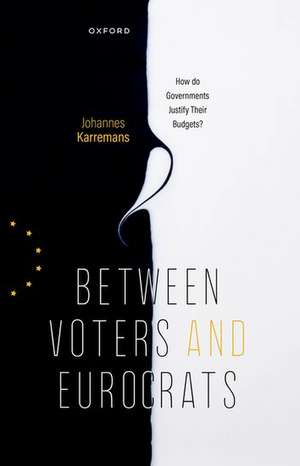Between Voters and Eurocrats: How Do Governments Justify their Budgets?
Autor Johannes Karremansen Limba Engleză Hardback – 12 feb 2024
Preț: 472.42 lei
Preț vechi: 654.13 lei
-28% Nou
Puncte Express: 709
Preț estimativ în valută:
90.44€ • 94.37$ • 75.81£
90.44€ • 94.37$ • 75.81£
Carte disponibilă
Livrare economică 08-14 februarie
Preluare comenzi: 021 569.72.76
Specificații
ISBN-13: 9780192886583
ISBN-10: 0192886584
Pagini: 192
Dimensiuni: 160 x 241 x 17 mm
Greutate: 0.43 kg
Editura: OUP OXFORD
Colecția OUP Oxford
Locul publicării:Oxford, United Kingdom
ISBN-10: 0192886584
Pagini: 192
Dimensiuni: 160 x 241 x 17 mm
Greutate: 0.43 kg
Editura: OUP OXFORD
Colecția OUP Oxford
Locul publicării:Oxford, United Kingdom
Recenzii
Budgetary speeches are the moments when our elected officials justify their choices to the voters. Karremans uses these moments of political rationalization to explore the trade-off between responsiveness to voters and responsibility to international economic commitments. His results will surprise you. This is a creative and insightful analysis of the interaction between the populist and technocratic impulses in eurozone democracies.
Based on an original comparative analysis of the justifications provided by European finance ministers for their annual budget plans, Jan Karremans makes a major contribution to the analysis of public finance. He convincingly demonstrates how fiscal policy in five European countries shifted from fiscal responsibility, under the spell of austerity during the sovereign debt crisis, towards more electoral responsiveness in its aftermath, increasingly taking into account the distinct policy preferences of national constituencies.
To date, no scholarly work had systematically analysed governments' justifications for the policies contained in their annual budgets. This book is a novel and important contribution to the enduring debate about the relationship between (national-level) democracy and (international-level) economic integration, and provides one of the most advanced and detailed measurements of the balance between democratic responsiveness and institutional responsibility. Jan Karremans relies on a rigorous comparative research design and mixed methods to speak with political scientists and political economists, economic sociologists and economists and the broader scholarship in European Union Studies.
Based on an original comparative analysis of the justifications provided by European finance ministers for their annual budget plans, Jan Karremans makes a major contribution to the analysis of public finance. He convincingly demonstrates how fiscal policy in five European countries shifted from fiscal responsibility, under the spell of austerity during the sovereign debt crisis, towards more electoral responsiveness in its aftermath, increasingly taking into account the distinct policy preferences of national constituencies.
To date, no scholarly work had systematically analysed governments' justifications for the policies contained in their annual budgets. This book is a novel and important contribution to the enduring debate about the relationship between (national-level) democracy and (international-level) economic integration, and provides one of the most advanced and detailed measurements of the balance between democratic responsiveness and institutional responsibility. Jan Karremans relies on a rigorous comparative research design and mixed methods to speak with political scientists and political economists, economic sociologists and economists and the broader scholarship in European Union Studies.
Notă biografică
Johannes Karremans is Professor in Political Science at the European School of Political and Social Sciences of the Catholic University of Lille. He holds both the Austrian venia docendi and the Italian national scientific habilitation. Prior to his current appointment, Professor Karremans held several post-doctoral positions at the European University Institute, the University of Salzburg, and the University of Lisbon. Between 2019 and 2021, he was holder of the prestigious Lise Meitner grant from the Austrian Science Fund. His research has appeared in several leading scholarly journals, including West European Politics, Party Politics, the Journal of European Public Policy and the Journal of Common Market Studies.
